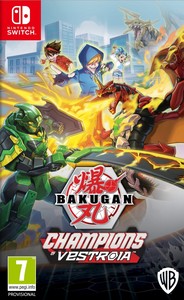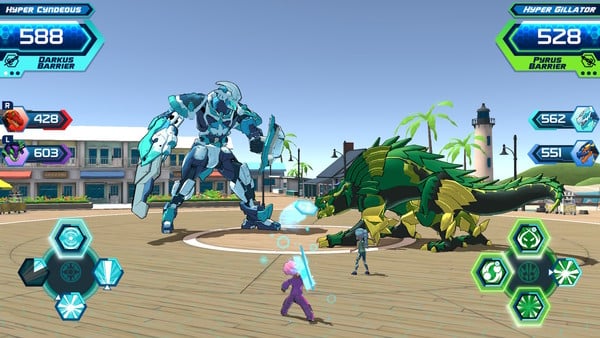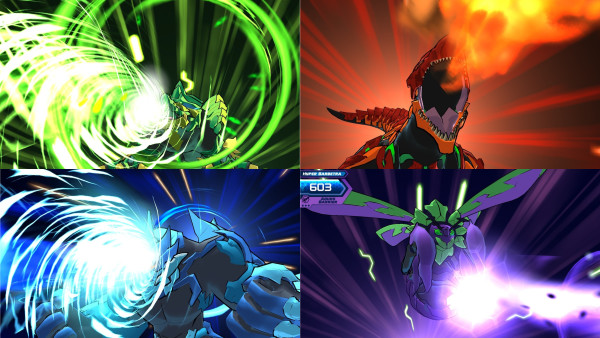Game Review
by Myles Gibbs,Bakugan: Champions of Vestroia
Nintendo Switch
| Description: |  |
||
Champions of Vestroia is Bakugan's take on the monster-collecting RPG genre. It takes some unique steps in some interesting and smart directions, but also holds onto some of the more tedious aspects of other games in its fold. Like every other Bakugan game, the experience it puts forward is entirely unto its own. |
|||
| Review: | |||
The Bakugan franchise has sold kaiju brawlers, duel simulators, and even tower defense games – these titles have variety in droves, and this is no exception. Vestroia commits itself to being a turn-based RPG, albeit with a bit more of a complex dynamic to it – but I'll get into that later. This game has a clear focus on PvP interactions over its own base game, and this is where Vestroia both succeeds and comes up short. A strong case of substance over style makes this game something of a gem, but because it leans too far into this trend, it suffers from a critical lack in aesthetic appeal – something painfully necessary for a title with gameplay as subdued as it is. I went into Vestroia with high expectations for some specific facets of the game. My fingers were crossed for a monster-collecting RPG with a unique combat system, strategic depth, and a fleshed-out metagame geared at player vs player interactions. And all these were delivered on. The basic concept of the Vestroia pans out well: race your opponent around a battlefield in real-time, and either beat them to the energy drops that enable your attacks or block them from doing the same. This, paired with all sorts of deployable attack effects – such as debuffs to attack cooldowns, inflicting damage over time, raising shields or buffing attacks – makes for some very interesting and complex situations during PvP play. Even in the story mode, Champions of Vestroia touts a sharp difficulty curve. It wasn't rare in my playthrough for me to sometimes make a mistake during combat, lose a Bakugan, strategize how to optimize what I had left to work with, and somehow pull a win by the skin of my teeth. This brand of manageable difficulty bonded me to certain Bakugans during the beginning of the playthrough. It was an exhilarating moment when my Cyndeous just barely secured victory at the very first Brawling Club that I challenged, and I have to give Vestroia credit for being able to provide a memorable experience like that. However, the longer I played this game, the rarer these moments become, while the cracks in the experience became more and more evident.  Tedium is hands down the biggest drawback of this title, and I don't say that lightly: it snakes into almost every aspect of the game. The visuals, music, and quests all become samey to the point that they quickly become indistinguishable. Since I've been covering combat, I'll start there. The biggest offender here is the lack of aesthetics. Due to the premise of running around the arena collecting energy in order to attack, battles typically take quite a while to ramp up and reach their conclusions. Most of the time, you'll be watching two giant models of your opposing Bakugans biting, stomping, or waving fists at one another ineffectively (since no actual damage is being done during these sequences). When an attack is finally shot off, the payoff is quite lackluster: Each attack basically amounts to the Bakugan doing a simple animation and then releasing a beam in the color of its corresponding type. If I were to watch a specific attack from a Bakugan without the subtitles telling me the name of the attack, I would be absolutely clueless as to what was going on.  Compare this to similar turn-based RPGs like Pokémon or Persona in which each move is typically visually distinct from the others, and the issue becomes clear. For turn-based combat to work, the player has to feel like the move they just executed is a touch of their own flavor – their own choices – on the gameplay. In this game, I couldn't tell the attacks apart well enough to ever feel that way. The next misstep in the aesthetics department – or perhaps just with the game overall – is a lack of variety in Bakugan design. Throughout my entire playthrough, I think that I saw at most 20 different Bakugans, each with various re-skins for different types. The lack of creatures in this creature-collecting game is its biggest failing; imagine if Pokémon had launched with only 20 distinct creature designs, each recolored five times – it simply would not have sold. The premise of a creature-collecting game is that you get to leave your unique mark on the plot by building a team of your own choosing while discovering new, playable creatures throughout the game. When you realize that you don't have that many choices to build your team with, and that you've already seen most of the creatures five hours in, it loses the appeal that the genre presents. Other elements of the game also fail to impress. The battle music is a nightmare: I consistently had to mute the game during combat to stave off headaches, while music in the overworld varied from being inoffensive to not being there at all – replaced instead by decently immersive ambient noise. The main plot, along with side quests, move along at a steady pace in the beginning of the game, but devolve into mind-numbing fetch quests after about two hours in. At one point I'd amassed a huge backlog of side quests, all of which amounted to objectiveless search-and-finds: “Look through the city and find the triplets.” “Look through the city and find the paper cups.” “Find Jack's four sisters.” “Help Anne find her missing item in the sand.” These quests and many others would have me spend my in-game time blindly searching through a painfully bland overworld, padding out a playthrough that I already felt was wasting my time. The main quests followed the same trend, constantly leading me on wild goose chases where I would go talk to one character who would then tell me to go find another character (and I would have to talk to multiple NPCs in order for the game to show me where the character in question was), only for them to tell me to go find and talk to someone else. Sequences like this would sometimes go on without an ounce of actual gameplay for over 15 minutes at a time, sucking dry any remaining enjoyment that I might still be having with the game. Champions of Vestroia offers a unique and fleshed-out combat system, but the actual game is so devoid of fun that I find it difficult to suggest to anyone – even fans of Bakugan. It's one saving grace is its well-thought-out online PvP systems, which could offer a good time to those wanting to compete on this brand-new Bakugan stage. However, I can't tell how many people you'll actually be playing with at the end of the day, since you'll need to finish the story mode in order to have any sort of competitive presence in the meta. At the very least, it certainly isn't worth its current $50 price point. I have some hope for a sequel that will run with the concepts that worked here and leave everything else behind, but I'm definitely not going to hold my breath. |
|
The views and opinions expressed in this article are solely those of the author(s) and do not necessarily represent the views of Anime News Network, its employees, owners, or sponsors.
|
| Grade: | |||
Overall : C+
Graphics : C
Sound/Music : D
Gameplay : B-
Presentation : C+
+ Appealing and unique competitive scene |
|||